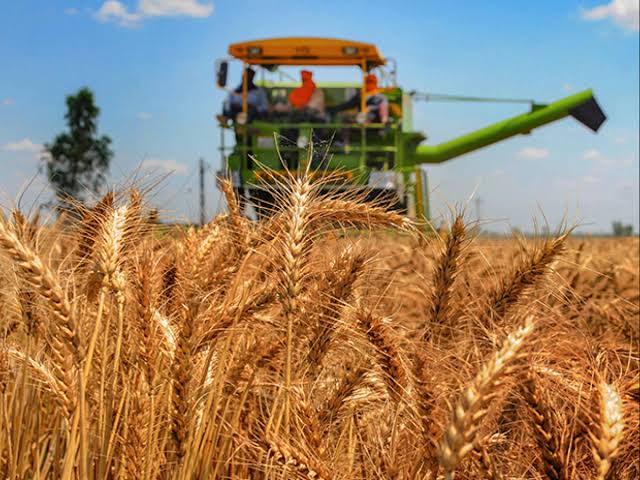Business
CBN to the rescue as wheat crisis worsens

BY EMEKA EJERE
It will take a lot more efforts for Nigeria to get to its destination in the journey to self-sufficiency in the production of wheat, available statistics have shown.
Wheat is the second-highest contributor to the country’s food import bill, putting strain on the country’s foreign reserve, with over $2 billion spent annually on the importation of more than five million Metric Tons (MT) of wheat.
It is estimated that with only 1%, or 63,000 metric tons MT of the 5-6 million MT of wheat eaten yearly grown locally, Nigeria occupies a prominent position on the list of nations with high need for wheat and inability to meet the demand.
Last week, the federal government revealed that wheat production in Nigeria had crashed by 89.44 per cent, dropping from about 350,000MT annually since 2017 (according to a report from the Federal Ministry of Agriculture and Rural Development), to as low as 36,943.8MT.
Data from the latest report of Wheat Production Survey in Nigeria 2021, which was obtained from the National Bureau of Statistics (NBS) showed that the 36,943.8MT was produced in 13 states.
The 13 states include Kano, Jigawa, Kebbi, Bauchi, Kaduna, Gombe, Yobe, Katsina, Plateau, Sokoto, Zamfara, Borno and Adamawa.
Industry operators say the rise in the cost of bread and pastries, triggered by the hike in flour price, was due to the low domestic production and high imports of wheat, a major raw material for flour used in baking.
The NBS, however, stated that wheat farming was experiencing renewed interest from policymakers who saw Nigeria’s potential to be self-sufficient in wheat production.
“But as vital as wheat is, we cannot say with certainty the actual quantity of wheat produced in the country as conflicting figures were being published from different sources,” the bureau stated.
It added, “There has been no recent survey or study to estimate the wheat production in Nigeria. The last official estimate of the wheat acreage is 60,000 hectares and dates back to 2008.
“Much has changed since then, and this study provided an overview of the current wheat production in Nigeria. The wheat production survey was conducted across 13 states in Nigeria covering 2020/2021 farming season by the NBS.”
The report had indicated that since independence, Nigeria’s wheat imports had consistently exceeded local production, as the consumption of the product had also continued to rise.
The Federal Ministry of Agriculture and Rural Development (FMARD), report had shown that in the 1960s, 1970s, 1980s and 1990s, wheat production domestically were around 5,700MT, 65,000MT, 50,000MT and 170,000MT, respectively, while imports were 148,000MT, 194,000MT, 680,400MT and 1.1 million MT, respectively.
Domestic consumption during the periods was put at 144,000MT, 191,000MT, 686,000MT and 1.115 million MT, respectively.
The report had also stated that in the 2000s and 2010s, national production levels dropped to 50,000MT and 70,000MT respectively, with consumption levels of 883,000MT and 3.41 million MT respectively, and imports were 861,200MT and 3.316 million MT respectively.
Farmers blame the plunge in wheat production in Nigeria in 2021 on rising insecurity, lack of skilled farmers and climate change.
The National Vice President, All Farmers Association of Nigeria (AFAN), Chief Daniel Okafor, in a statement seen by our correspondent, said the situation might not improve if insecurity and other concerns in the sector were not addressed.
He said, “What happened last year which affected wheat production, was a general issue in Nigeria, as it also affected other crops. However, in Nigeria, only a few states cultivate wheat.
“Climate change is one factor that impacted adversely on crop production in 2021. That is the first thing I know that affected production and it affected wheat adversely.
“Another thing is that the ministry of agriculture is not helping matters with the way and manner they promote the production of crops. They have to change the way they deal with various crop associations and farmers.”
He added, “They should give farmers the required training, particularly for special crops like wheat. This will ensure that farmers carry out good agricultural practices in wheat production and it will definitely help in boosting our various outputs.”
On insecurity, Okafor said, “Another thing is that farmers are not going to their farms again and this is a problem to the country. This is because of the spate of kidnappings and other crimes across the country.”
CBN intervenes
As a way forward, the Central Bank of Nigeria (CBN) has devised strategic action plans to increase wheat production by addressing existing difficulties in the value chain and, as a result, bolstering the country’s foreign reserves.
The apex bank had at a recent wheat conference and stakeholders’ engagement in Abuja, stated that it planned to focus attention on the wheat value chain for dry season planting in 2021/2022 after making sustainable progress throughout the rice and maize value chains.
Accordingly, the Bank has concluded arrangement to disburse N41bn through Heritage Bank Plc to farmers across different states for the expansion of wheat production to meet high demand.
Heritage Bank said in a statement that the fund would consummate the expansion of Wheat Seed Multiplication Project, as part of the CBN’s Brown Revolution Initiative, an intervention programme to flag off and support the commencement of dry season wheat farming across Nigeria.
Speaking on the initiative, the CBN Governor, Godwin Emefiele, said the move was part of the apex bank’s intervention to address the challenges in wheat value chain, thereby increasing the domestic production of wheat and closing the wide supply gap inherited in Nigeria agricultural space.
He said following the successes in the Anchor Borrowers’ Programme, the apex bank decided to extend the gains recorded in rice and maize value chains to wheat production, adding that the programme would benefit over 150,000 farmers, and would be implemented in 15 states on about 180,000 hectares of land.
Emefiele said, “Wheat is the third most widely consumed grain in Nigeria after maize and rice. It is estimated that the country only produces about one per cent (63,000 metric tons) of the 5-6 million metric tons of the commodity consumed annually in Nigeria.
“This enormous demand-supply gap is bridged with over $2bn spent annually on wheat importation. This has made wheat the second highest contributor to the country’s food import bill.”
The Managing Director/Chief Executive Officer, Heritage Bank, Ifie Sekibo, said the Brown Revolution Initiative would help reduce the nation’s food import bill by increasing wheat production.
He said it would create market linkages between smallholder farmers and anchors/processors, create an ecosystem that drives value chain financing, improve access to credit by the smallholder farmers by developing credit history through the scheme.









